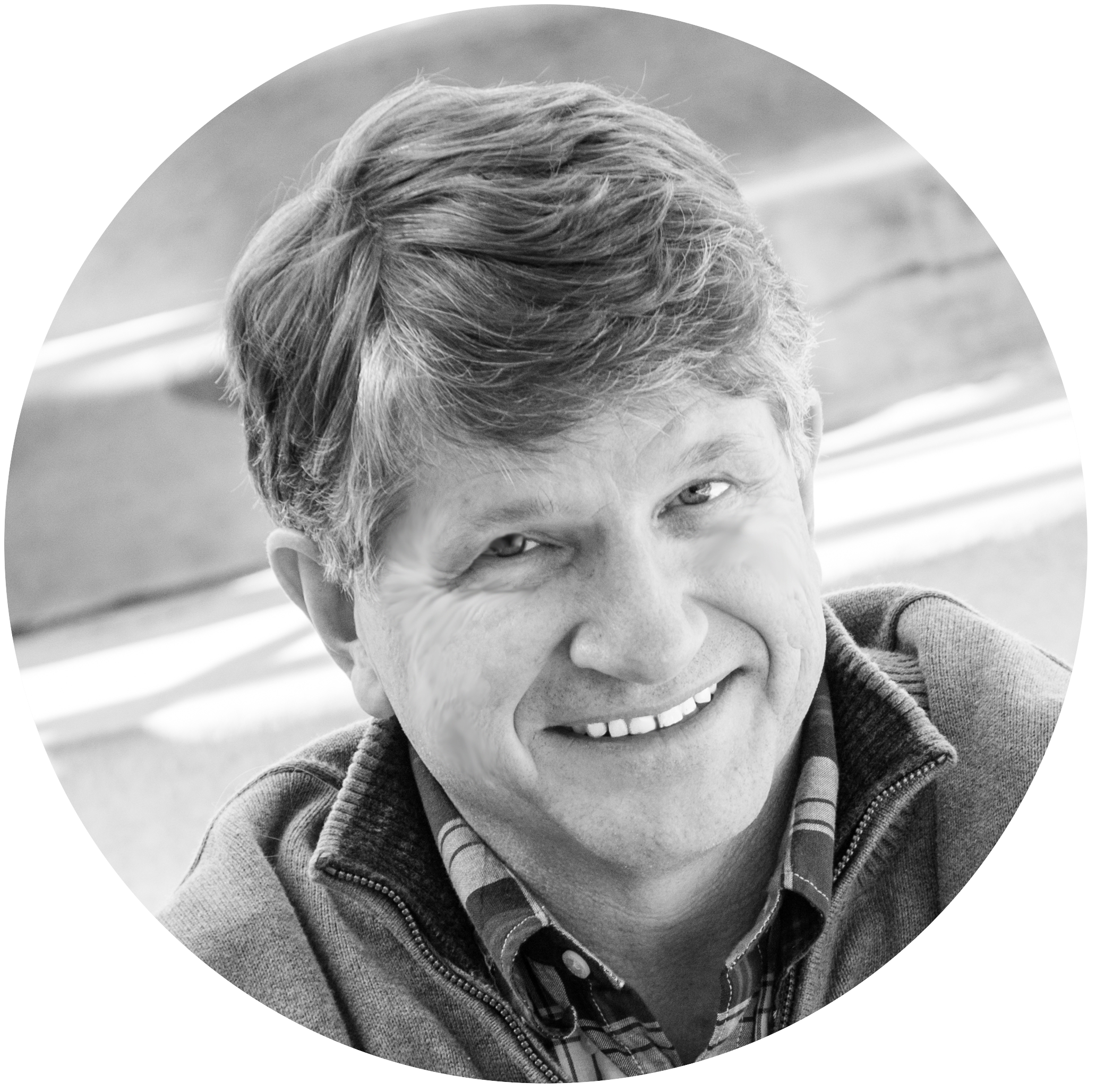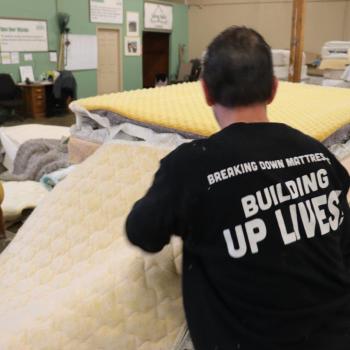As a kid, I watched with wide-eyed fascination the campy Lost in Space television series. The recent reboot on Netflix keeps the Robinson family structure, as they battle various challenges using the skills of their super-smart kids and savvy first-mate, only to be thwarted by the scheming Dr. Smith.
And there’s Robot. Despite being a high-tech machine that can fix anything, fight anyone and even display human emotion, his verbal programmers designed his language to be at toddler level, uttering just a few simple words. His most famous expression carries a warning: “Danger, Will Robinson.”
As the battle with the President has only amplified, Evangelicals are increasingly getting pulled into the debate by all sides. And those forces who are seeking to draw us in, want to use us. Frankly, it’s a trap. Like the Robot at Will’s side, I too am saying, “Danger.”
The United States is a strong influence to the peoples of this planet, bringing progress and justice to the world. But divided? We fall. And that’s what is happening now. Vultures are seeking to divide Christians the same way they have divided Americans.
Danger.
Yes, Danger.
The Church should be the ultimate safe space
The rhetoric was amplified this last week when Christianity Today Editor Mark Galli’s wrote an editorial that called for President Trump’s impeachment. In response, the Christian Post published a pro-Trump piece, signed by 200 leaders. Editor Napp Nazworth quit the publication, saying “It’s bad for the gospel.” Everyone is taking sides and now we are battling each other, much to the glee of secularists.
Does anyone think this is good for the church?
I have subscribed to Christianity Today for at least 30 years and I am loyal to the publication and it’s continued committment to the Gospel. There editorial struck me as a stark departure from it’s normal, nonpartisian stance. I was surprised.
Two years ago, I was briefly considered by a search firm to serve as President of Christianity Today, but was rightly upended by more qualified individuals. However, if I were in charge, I wouldn’t have allowed the editorial. Why? Not because it was anti-President Trump, but because it detracts from the Christian message in today’s hyperdrive world.
The Church should be a safe space, a place where Never-Trumpers and All-in Trumpers and Just Don’t Care can all be at the Divine table. It’s a place that puts us all on the same level – broken humans who need God.
The church should call for repentance of leadership. Setting a high standard in society is part of our cultural responsibility of being salt and light. But being in the world and not of it takes a special balancing act that few seem to be pursuing.
So many of my friends have lost their minds in politics – on both sides – and along the way have lost their passion. I have a good friend who had a vibrant ministry to guide students in intellectual faith pursuits. Now, his focus seems to be publicly decrying the President and those who voted for him. Conversely, another friend used to be an ardent apologist, reasonably guiding the doubter into faith. Now, he spends most of his energy on making sure the Right wins. What has happened to the people of God? Will we let one person, one political figure knock us off our mission?
Throughout time, Christians have sat under the rule of knaves, fools and despots. Run through the list of rulers and rarely is there a righteous man, an upright woman in charge. Our job is to do what we are called to do. And in this environment, where people are looking to exploit the Christian voice, I think it’s wisest to stand down and stay out of this argument. Here’s why:
We’ve seen this before, and we got burned
I’m old enough to remember the Moral Majority, the Jerry Falwell led movement to restore faith elements to our society using political means. It moved people who had stayed true to the faith through the cultural upheavals of the 60’s and were left behind by the sexual liberation and the loss of an ordered society. The threats of Communism and secularism coalesced a broad coalition of people.
In many cases, it led to deeper faith, a defined church that actually stood for something. But the alignment with politics left a bad taste in our mouths. Too many candidates, seeking our vote, pandered to us. We gave our loyalty and then found their character to be lacking. We hitched our wagon to horses that were sick.
And for decades now, Evangelicals have been unfairly associated with a single political party, forcing us to answer for policy failings and moral disappointments.
The bottom line. We serve another King.
We aren’t monolithic
Most secular people do not understand what an Evangelical is. Many Evangelicals don’t even understand.
But the stereotypes don’t always work. Evangelicalism is an umbrella term generally used for those who believe that Jesus calls us to follow him, to be “born-again.” It reaches into many denominations, cultures, races, and nations. It transcends political affiliations.
Timothy Dalrymple, the current CEO of Christianity Today, responding to criticism rightfully said this. “American evangelicals have always been a loose coalition of tribes. We have fought one another as often as we have fought together.”
In my own small circle of Christian friends, I have liberals, Democrats, Republicans, conservatives and libertarians. At my large nondenominational, Evangelical church, there are Latino, Black, Asian and White faces both in attendance and in leadership.
In the church parking lot, I’ll see a Bernie stickered Prius parked next to Make America Great red truck. The world doesn’t understand how this works, because they are more interested in defining us than understanding us.
The media wants to “blame” Evangelicals for voting in Trump, ignoring the millions of liberal voters who crossed over to vote the other way. And the addition of outspoken Christian Mike Pence to the ticket didn’t hurt.
Lots of Evangelicals supported Marco Rubio and Ben Carson early in the process, but the primaries aced out these more righteous men. It wasn’t the first time people of faith have held their nose while filling out a ballot. In a political world of limited options, things are not always clear cut.
I voted third party. Other Evangelicals of good conscience voted for Clinton. Others for Trump. Politics are a matter of individual – not group — conscience and we should respect that.
Constitutional scholar Jenna Ellis said this.
“Everyone seems to think that one’s political registration is indicative of their entire worldview and predilections.The parties simply are not monolithic. Neither are Americans so easily polarized to be able to fit neatly within D or R that the party affiliation is literally the only thing you need to know about a person to predict everything else about them. Politicala aren’t meant to be religions or entire worldviews.”
Evangelicalism isn’t a political movement
Being an Evangelical is about being part of a faith community, not a political movement. Secularists don’t get evangelicals. They broadly define us when it’s convenient, when it fits a narrative of bigotry. And they narrowly define us when something good comes out of our faith. Being misunderstood is part of the games.
To be an Evangelical is to believe in the saving grace of Jesus Christ, to have a born-again experience, and to share that faith – evangelize – others. It’s not about politics.
I have sat through at least 3,000 church services in a number of evangelical traditions. and I cannot recall a single time that politics ever come up. Not once has a political figure been discussed except as a matter of prayer.
I cringe when the media turns to the loudest voices to define us – Franklin Graham, Robert Jeffries, and Jerry Falwell Jr. and now, Christianity Today (ex) editor Mark Galli. On both sides, we are being pushed into political boxes. I’m not that simple where I can be defined by a party.
Interesting, Leith Anderson who heads the largest organization of evangelicals, The National Association of Evangelicals, is rarely sought out in political matters. Why? Because he says things like this. “Evangelicals may all share the same faith, but we don’t all share the same politics.”
Evangelical African Americans, Hispanics, Asians and White Europeans all share the same Savior – and it has nothing to do with who is in office.
We do have a voice in our society, but it needs to transcend common politics. I don’t see that today.
Evangelicals are vital to the local community
Just because I don’t participate in the political volley, doesn’t mean I don’t care. Along with millions of others of Evangelicals, we are vital parts of our communities. We run soup kitchens and mental health centers. We staff crisis centers and greet prisoners as they are released with open arms. We clothe immigrants and house single mothers. Some of these functions cross into government as a natural intersection. But our first calling is to humans and our solutions are church community based, not government-based.
We care about the world, with a global mindset that would surprise most people. We give more money, give more time, and do more work than any government or people group. They donate to charities that do extensive aid work overseas.
Look at your own community, at the men and women who are engaged in the hard work of the hurting and needy. The testimonies of restored marriages, addictions conquered, and confidence restored is a Gospel message that is carried by Evangelicals.
It is hands and feet of faithful people, silently doing the hard and messy work. This is not political in nature and carries little controversy. That’s who we are. That’s the Silent Majority.
Photo by nikko macaspac on Unsplash
Conclusion
It’s okay to have a political opinion, to vote and to be active. There are many political matters that are important. I have great respect for those who do the hard work of keeping the political system as close to righteousness as possible. But too many have forgotten God Almighty. They spend far more energy in a four-year election than eternity.
It’s also perfectly acceptable to have political differences. My closest friends stake their tents in distinctly opposite corners than mine. And I’m okay with that. CT’s Dalrymple also said this. “Evangelicals of different stripes cannot continue to shout one another down, bully those who disagree, or exclude one another and refuse to listen.”
I’m guiding by this exhortation by King David, who knew a thing or two about politics, evil and popular opinion.
“Some trust in chariots and some in horses, but we trust in the name of the LORD our God.” — Psalm 20.7
And that my friends is why we need to stay out this current fight. We honestly have more important work to do.















